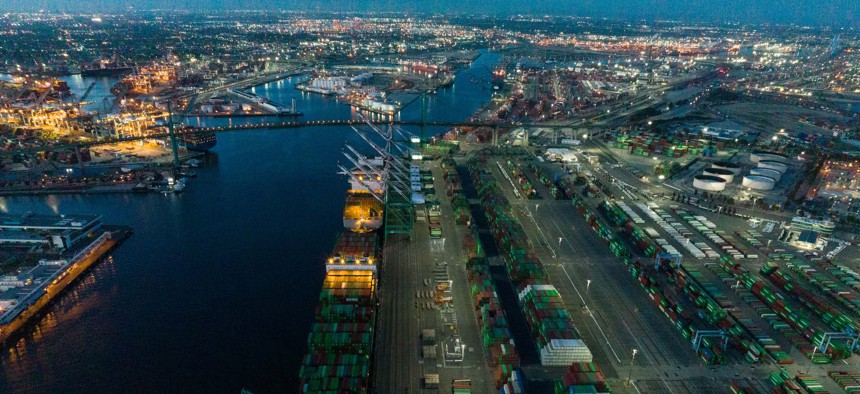Freight Advocates Push for a Share of $18B in Grant Funding

An aerial view of shipping containers sitting stacked at the Port of Los Angeles at night in April 2022 in San Pedro, California. Getty Images / VCG
They’re urging the Biden administration to factor in their priorities when distributing money from the new infrastructure law for ports, railways and “megaprojects.”
Moving freight should be the Biden administration’s top priority when deciding what big-ticket projects it should fund with money from the new federal infrastructure package, according to a broad coalition of business groups.
The groups urged Transportation Secretary Pete Buttigieg to “dedicate as much as allowable by law” from the grants his agency controls to “confront the supply-chain challenges that are adversely impacting the U.S. economy and the daily lives of all Americans.”
They specifically called for freight movement to be the top priority of three programs that, together, will dole out $18 billion over the next five years. The three programs they highlighted were:
- National Infrastructure Project Assistance grants, nicknamed “Mega” grants, for major projects that are too big for traditional grant programs.
- Infrastructure for Rebuilding America (INFRA) grants, which fund freight and multimodal projects of national significance.
- Consolidated Rail Infrastructure and Safety Improvements (CRISI) grants, which are directed to improvements for passenger and freight rail.
Fifty-nine business groups signed onto the letter, which they sent last week. The signatories included the U.S. Chamber of Commerce, National Association of Manufacturers, American Trucking Associations, the Association of American Railroads and many interest groups associated with roadbuilding.
Dean Franks, the senior vice president for congressional relations at the American Road & Transportation Builders Association, spearheaded the effort to get business groups to weigh in on the importance of addressing freight slowdowns with the new infrastructure projects.
He told Route Fifty that the goal was not to criticize the administration, but rather to encourage its support for freight-related projects by showing the broad support they have. The letter does not list any specific concerns with the way that Buttigieg or the Biden administration are handling the grant process.
“There is a direction that the administration has gone with the application for states and localities to use these funds that seems to be a little different from the intent of the law, at least as we see it and as Congress wrote it,” Franks said. “That said, ask us after the first round of awards, and then we’ll know if there is concern moving forward. We sure hope there isn’t.”
The missive comes at a time when many business groups, Republican politicians and state transportation departments have criticized the Democratic administration for putting too much emphasis on using infrastructure spending to address issues such as increasing racial equity, mitigating climate change and supporting labor unions.
The criteria for two of the programs highlighted in the letter include consideration of some of those items. The notice of funding opportunity for the Mega and INFRA grants recently announced by the Biden administration judges potential projects by their ability to show benefits in six areas, but freight movement was only part of one of those criteria.
The Transportation Department said it would evaluate projects on how they improve safety, state of good repair, economic impacts (including freight movement and job creation), the environment (including climate change and climate resilience), quality of life (including equity and multimodal options) and innovations in technology, project delivery and finance.
Likewise, with rail projects, the Biden administration indicated that it would incorporate considerations about climate change impacts, environmental justice, racial equity and improving rural infrastructure as it selects recipients for CRISI grants.
The widespread disruptions to supply chains over the last few years started with cascading problems caused by the Covid-19 pandemic, including factory shutdowns, workforce shortages and surges in demand for consumer goods.
But infrastructure, Franks said, is “one of the many factors” that has contributed to the backups.
“Port congestion could be alleviated with better infrastructure in and around ports,” he said. “Bottlenecks on roadways and freight rail could be alleviated with better infrastructure.”
“The pandemic and subsequent supply chain issues have only drawn attention to… some of these preexisting issues,” he said.
The U.S. Department of Transportation did not respond to a request for comment.
Daniel C. Vock is a senior reporter for Route Fifty based in Washington, D.C.
NEXT STORY: FirstNet boosts in-building coverage






